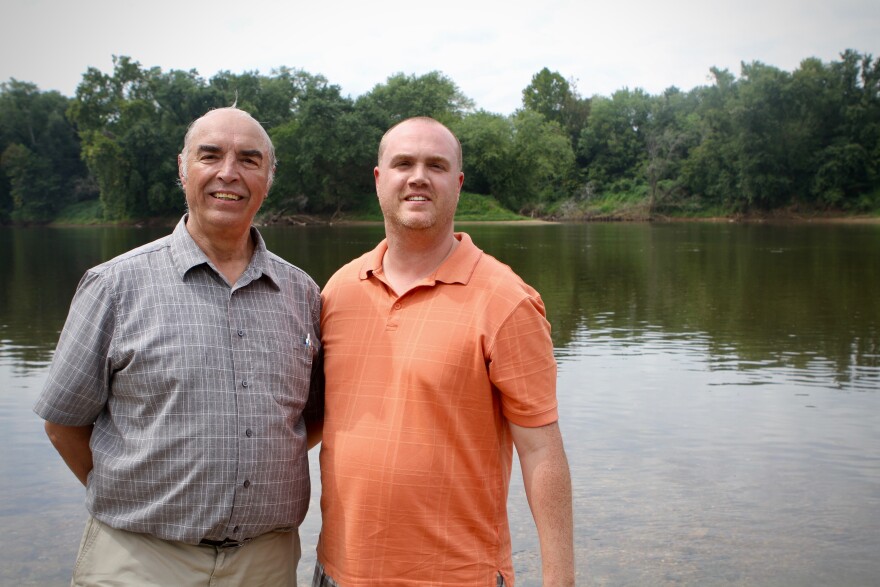In Central Virginia, at a point where two rivers merge, there’s a little-known site with great historical value. For centuries, it was home to the chief village of the Monacan Indian Nation.
But today the Monacan Tribe is fighting to keep the area untouched as officials in Fluvanna and Louisa Counties push to put a water pump there.
On the shore of the James River Monacan Chief Kenneth Branham watches Tribal Administrator Rufus Elliott wade into the shallow water. He opens his hand to reveal something luminescent.
“Little shell pieces,” Elliott explains, touching through them. “Traditionally we made jewelry out of this.”
Just across the river here the land is overgrown with trees and shrubs. And while it may not look that different from any other swath of rural Virginia, it was once a chief capital city of the Monacan Nation. It’s called Rassawek.
Elliott says the site is not only historically important to his people, it’s spiritually important.
“We say all the time that the ground we stand on is made up of the dust and the bones of our ancestors,” he says. “And no place probably more identifies with that than this area right here.”
Chief Branham is confidant he has ancestors buried right over there. One of his greatest fears is that construction on a water pump will unearth their bodies.
“We need to respect what they did and respect their resting place,” says Branham.
But the Monacan Tribe doesn’t own that land and they don’t have any legal claim to it. Fluvanna and Louisa Counties own it, through a joint venture called the James River Water Authority.
The JRWA plans on building a water pump house and short pipeline on the land, even though archeological testing in the area, in the 1980's, showed human remains.
“It is highly likely that there are many more burials associated with this Chief’s village,” says archeologist and retired University of Virginia professor Jeffrey Hantman.
Hantman is an expert in Native American history, and has written a book about Monacan history. He says Rassawek was a powerful chief village, and the center of the Monacan world.
“It was for the soil, it was for the trade connections, the political control,” he explains.

That history has been long-known and well documented. Rassawek is on a map drawn by John Smith in the early 1600’s. In the 1930’s a Smithsonian researcher confirmed the site. And in the 1980’s Virginia’s Department of Historic Resources acknowledged the site.
Still, the two counties say they need to provide water to the rapidly developing area around Zion Crossroads, and that pulling it out of the river at this spot is the most practical way forward. The water quality is high and it’s close to existing infrastructure.
Attorney Justin Curtis says choosing a new spot could mean years before the project is finished.
“The area is growing, the population is growing, people are coming,” Curtis says. “The question is, are we going to have water available in time for those buildings and new homes to be occupied?”
In addition to taking longer, Curtis says moving the pumphouse could double or triple the cost of the project. Louisa and Fluvanna taxpayers would be on the hook.
He says the water authority is willing to let tribal members watch excavations, and they’ve offered $125,000 for improvements to the tribal museum. They’ve requested that any artifacts dug up on private land be returned to the tribe.
“We’ve been working with the Monacan Indian Nation for the last couple years to try to do the best we can to accommodate their concerns, their sensitivities, and their needs, and do whatever we can to try to meet them halfway,” says Curtis.

Archaeologist Jeffrey Hantman is not impressed.
“It’s colonial is what it is. It’s scientific colonial,” he says. “It’s like ‘We’ll make that decision and then we’ll give you these bones and we’ll give you these artifacts.’ And the Monacans, all the tribes today, are more sophisticated than that.’
The Monacan Tribe has hired a law firm and they have one request -- don’t build on Rassawek.
Tribal leaders Branham and Elliot say protecting this sacred site is one of their highest responsibilities.
“On our terms and with our voice,” Elliott says. “And everytime I speak on a tribal matter I hope that I’m speaking in a way that would please my ancestors...at the end of the day you want to go home knowing that you didn’t do anything that would be detrimental to their memory.”
Branham says it’s his responsibility to protect not only his ancestors, but this land for future generations.
The James River Water Authority still needs a permit from the Army Corps of Engineers before they can build. As a federally recognized tribe, the Monacan Nation is considered a consulting party in that process.
The Corps hasn’t whether they’ll grant the permit, those discussions are still ongoing. The Monacan Tribe has promised a lawsuit if the permit is granted.
This report, provided by Virginia Public Radio, was made possible with support from the Virginia Education Association.


